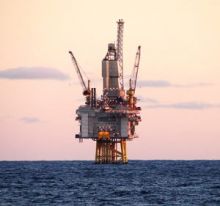Ukraine’s Cabinet of Ministers has permitted the Chornomornaftogaz state-run corporation and Lukoil plc to sign a contract on joint prospecting for and extraction of oil and gas from the Black Sea shelf. Cabinet instruction No. 2361 of December 20, 2010, says that the Ukrainian state-run company will have at least a 50-percent stake. The Ukrainian and Russian companies are expected to jointly develop the Odesa, Bezimenne and Subotyn deposits. Chornomornaftogaz’s contribution will be an economic evaluation of the reserves of oil, natural gas and concomitant components in the abovementioned deposits. The Russian company must in turn provide financial resources, technologies, and equipment to prospect for and extract oil and natural gas.
Active development of the Black Sea shelf has been a point of heated debate since 2005. Top officials believe that deep-sea hydrocarbons could relieve this country from having to import gas and supply industry and the populace with national energy resources. However, real offshore oil and gas production still remains on the drawing board.
Meanwhile, the demand for gas and oil in this country increases with every passing year. In 2010 Ukraine cut the extraction of oil with gas condensate by 10.3 percent to 3.546 million tons in comparison to 2009. Ukraine’s Prime Minister Mykola Azarov, too, recently noted this negative trend. He sharply criticized the performance of the coalmining and power-generation sectors and suggested dismissing inefficient managers.
So what are the chances that, thanks to the Russian company’s support, Ukraine will be able to procure oil and gas from the seabed? The Day asked some experts in this field to comment.
Volodymyr Omelchenko, a leading energy expert at the Razumkov Center, does not approve of this contract because the state will not benefit from it strategically. “Ukraine depends on Russian supplies — 60 percent for oil and 70 percent for gas. Developing the shelf with the help of a company from a country on which we are already dependent in terms of fuel supplies can only worsen the situation,” he says.
“On the one hand, signing this contract will produce a positive result because a high-profile investor is coming to this country. There is a chance that Ukraine will at last begin a more active search for and development of oil and gas deposits in the Black Sea,” says Oleksandr Todiichuk, president of the Kyiv-based international Q-Club that deals with energy issues. He estimates it will take five to seven years after the signing of a contract on joint development of the shelf to begin extraction. Yet the expert doubts whether oil and gas will be successfully produced. “I have never heard that Lukoil has much experience with offshore technologies, especially deep-sea hydrocarbon extraction,” he explains.
According to Bohdan Sokolovsky, ex-advisor to the president of Ukraine in international energy security, the Russian side is not interested in shelf development, for this will create additional competition for Russian gas and oil. So he forecasts that, in all probability, these deposits will be put on hold, while Ukraine will continue to import Russian oil and gas.
It is also possible, in the view of Sokolovsky, that the Naftogaz Ukrainy national joint-stock company will soon be reformed and streamed for the production and transportation of oil and gas. “In this case Russia is already making steps to get into the new organizations. If I was them, I would do the same,” Sokolovsky says.
“If it really comes to developing the shelf, this cooperation should also include Western service companies,” says Mykhailo Honchar, energy program manager at the Nomos center. In his words, even the powerful and efficient Gazprom is unable to develop the Shtokhman deposit on its own. So it has to invite foreign (French and Norwegian) companies that work in this field.
In the opinion of Todiichuk, the Ukrainian government should openly invite bids for shelf development, choose an experienced company with a big name, and develop the Black Sea deposits. He thinks there are more than enough contenders for this, including such giants as Shell and Chevron. “They will come with pleasure to the Black Sea shelf, all the more so that geologists forecast large oil and gas pools there,” he sums up.
To win the trust of foreign investors, we should guarantee that they will regain the invested money and receive profits after the development of these deposits, Omelchenko believes. It is due to inadequate laws in this field that many foreign investors are dragging their feet, he says in conclusion.
The Day’s FACT FILE
The Chornomornaftogaz state-run corporation is part of the Naftogaz Ukrainy national joint-stock company and specializes in prospecting for and extraction of oil and gas in the Black Sea and the Sea of Azov. The corporation is now in charge of 17 deposits, including eleven gas, four gas condensate, and two oil fields. The overall reserves of all the deposits are 58.56 billion cubic m. of natural gas, 1,231 thousand tons of gas condensate, and 2,530 thousand tons of oil. Lukoil plc is a Russian oil company that owns six oils refineries in Russia, Ukraine, Bulgaria, and Romania. Their overall capacity is 14 million tons of oil a year.







